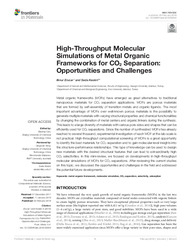High-throughput molecular simulations of metal organic frameworks for co2 separation: opportunities and challenges
| dc.contributor.author | Fındıkçı, İlknur Eruçar | |
| dc.contributor.author | Keskin, S. | |
| dc.contributor.editor | Cao, D. | |
| dc.date.accessioned | 2018-09-18T08:32:06Z | |
| dc.date.available | 2018-09-18T08:32:06Z | |
| dc.date.issued | 2018-02-02 | |
| dc.identifier.issn | 2296-8016 | en_US |
| dc.identifier.uri | http://hdl.handle.net/10679/5959 | |
| dc.identifier.uri | https://www.frontiersin.org/articles/10.3389/fmats.2018.00004/full | |
| dc.description.abstract | Metal organic frameworks (MOFs) have emerged as great alternatives to traditional nanoporous materials for CO2 separation applications. MOFs are porous materials that are formed by self-assembly of transition metals and organic ligands. The most important advantage of MOFs over well-known porous materials is the possibility to generate multiple materials with varying structural properties and chemical functionalities by changing the combination of metal centers and organic linkers during the synthesis. This leads to a large diversity of materials with various pore sizes and shapes that can be efficiently used for CO2 separations. Since the number of synthesized MOFs has already reached to several thousand, experimental investigation of each MOF at the lab-scale is not practical. High-throughput computational screening of MOFs is a great opportunity to identify the best materials for CO2 separation and to gain molecular-level insights into the structure-performance relationships. This type of knowledge can be used to design new materials with the desired structural features that can lead to extraordinarily high CO2 selectivities. In this mini-review, we focused on developments in high-throughput molecular simulations of MOFs for CO2 separations. After reviewing the current studies on this topic, we discussed the opportunities and challenges in the field and addressed the potential future developments. | en_US |
| dc.description.sponsorship | European Research Council (ERC) under the European Union's Horizon research and innovation programme (ERC) | |
| dc.language.iso | eng | en_US |
| dc.publisher | Frontiers Media | en_US |
| dc.relation | info:eu-repo/grantAgreement/EC/FP7/756489-COSMOS | |
| dc.relation.ispartof | Frontiers in Materials | |
| dc.rights | openAccess | |
| dc.title | High-throughput molecular simulations of metal organic frameworks for co2 separation: opportunities and challenges | en_US |
| dc.type | Article | en_US |
| dc.description.version | Publisher version | en_US |
| dc.peerreviewed | yes | en_US |
| dc.publicationstatus | Published | en_US |
| dc.contributor.department | Özyeğin University | |
| dc.contributor.authorID | (ORCID 0000-0002-6059-6067 & YÖK ID 260094) Eruçar, İlknur | |
| dc.contributor.ozuauthor | Fındıkçı, İlknur Eruçar | |
| dc.identifier.volume | 5 | en_US |
| dc.identifier.startpage | 1 | |
| dc.identifier.endpage | 6 | |
| dc.identifier.wos | WOS:000424007800001 | |
| dc.identifier.doi | 10.3389/fmats.2018.00004 | en_US |
| dc.subject.keywords | Metal organic framework | en_US |
| dc.subject.keywords | Molecular simulation | en_US |
| dc.subject.keywords | CO2 separation | en_US |
| dc.subject.keywords | Selectivity | en_US |
| dc.subject.keywords | Adsorption | en_US |
| dc.identifier.scopus | SCOPUS:2-s2.0-85057442478 | |
| dc.contributor.authorFemale | 1 | |
| dc.relation.publicationcategory | Article - International Refereed Journal - Institutional Academic Staff |
Files in this item
This item appears in the following Collection(s)
Share this page



